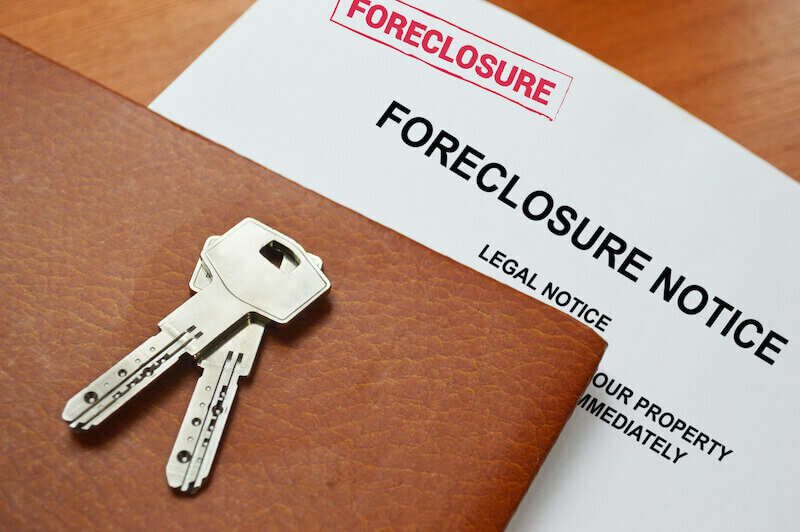Are you at risk of facing a foreclosure on your home in Wisconsin? If you’re facing mortgage foreclosure, you will need to learn more about Wisconsin statutes and Wisconsin foreclosure laws.
In the guide below, read all about Wisconsin foreclosure notice requirements including breach letters, a foreclosure sale, the redemption period, and a deficiency judgment once the foreclosure sale completes. You may want to choose to sell your home to pay off your mortgage and get out of debt.
Keep reading to find out about Wisconsin foreclosure notice requirements and the foreclosure process in the state. Now, let’s get started!

Wisconsin Foreclosure Laws
If you default on your mortgage payments in Wisconsin, the lender can pursue foreclosure on your loan and essentially take your home. The lender would need to file a lawsuit in court to begin the foreclosure process. However, state laws do protect the homeowners in case lenders file a foreclosure lawsuit.
During the COVID-19 pandemic, homeowners did gain significant benefits preventing a foreclosure action. Homeowners with a mortgage loan who faced financial hardship during the pandemic could gain up to $40,000 per household via the Wisconsin Help for Homeowners program.
The program in question helps homeowners make mortgage payments and cover other home-related bills.
In addition, homeowners in Wisconsin gain a grace period of 10 to 15 days if they miss the due date of their mortgage payment. Afterward, however, homeowners are likely to see a late fee as high as 5 percent of their monthly payment.
If multiple monthly mortgage payments are late, the lender will send letters to collect the loan payments. Before you see a notice of foreclosure, you will likely get a breach letter if you are behind on paying off your loan.
What Happens if You Miss a Mortgage Payment in Wisconsin
If you miss a mortgage payment on your real estate property in Wisconsin, you’ll see late charges after the grace period. If you miss several payments, federal mortgage servicing laws mandate that the lender contact you by phone to go over ways to avoid foreclosures, such as a loan modification and other legal advice.
The mandates provide a form of loss mitigation measures. Lenders have to contact you to discuss your options no more than 36 days after each missed payment. You will even obtain help from specific staff from the loan company.
Wisconsin mortgages also mandate that the lender send a breach letter once missed payments happen. Such a letter explains that the loan is in default and that if you don’t cover the missing amount, the lender can pursue the foreclosure process with a default judgment in a circuit court.
Some other issues that can occur if you have missed mortgage payments include:
- Negative reports sent about you to the credit bureau
- Late fees and penalty payments
- Your credit score dropping by 50 to 100 points
- The potential risk of bankruptcy
Wisconsin Foreclosure Requirements
If paying off your missing mortgage payments doesn’t work out, you will need to learn about the next steps in Wisconsin foreclosure requirements and how to prevent a foreclosure on your home.
If you do not have the amount due on your mortgage payments, you will still have access to loss mitigation measures and legal protections before you ever receive a notice of the foreclosure. For instance, you can get help from a HUD-approved housing counselor. Such a counselor will help you with a loan modification and/or refinancing.
Mortgages from Freddie Mac, Fannie Mae, the USDA, Veterans Affairs, and the Federal Housing Administration all have refinancing programs for homeowners facing a judgment of foreclosure risk.
Your best option to avoid a real estate foreclosure is usually to sell the home to the highest bidder. Federal law does not allow the lender or servicer of the loan to pursue a foreclosure until the loan is more than 120 days without a payment. However, in some special cases, foreclosures have begun sooner.
The lender then goes to court to start the foreclosure process and file a lawsuit. The lender sends a summons and complaint to make you aware of the foreclosure proceedings.
Breach Letters
Before the lender proceeds with going to court to file a lawsuit for foreclosure proceedings, you will receive a notice called a breach letter. That only occurs when you fail to pay your mortgage loan. Most mortgages in Wisconsin require the lender to provide a breach letter to a borrower who has missed payments.
The breach letter explains that the loan has defaulted and that you need to pay the required amount or risk losing your home. The lender can even accelerate the loan if the default isn’t fixed and then move forward with a foreclosure.
The breach letter usually needs to include the following specifications:
- The default
- The procedures that can cure the default
- The date by which the default can get cured, which is usually no more than 30 days from the day after sending the notice
- Failure of curing the default can lead to a foreclosure and sale of the real estate property
Filing a Response
After the foreclosure process begins, you will need to file a response or an answer with the court. You may need to work with a law firm to avoid the problems of a foreclosure. If you do not file an answer with the court, the lender may pursue a default judgment on your loan.
That type of judgment, if approved, allows the lender to sell your property in a foreclosure sale. However, if you file an answer, the entire case will move forward with litigation. In this case, the lender may request a summary judgment from the court. That type of judgment merely asks the court to favor the lender based on the facts.
You can also seek to participate in a foreclosure mediation program. In this case, the lender and borrower try to find ways to avoid a foreclosure. Also, you may want to pursue a short sale of your home and put up a notice of sale so that the lender knows your plans. Selling a house to get out of debt could end up the best choice for you.
Foreclosure Sale
Eventually, the WI foreclosure timeline leads to a foreclosure sale if nothing else has worked out. During the foreclosure sale, the lender produces a bid on the house with a “credit bid” instead of using money or cash for the bid. Using a credit bid, the lender receives credit for as much as the total amount of the borrower’s debt.
The lender may either bid the entire amount of the debt or potentially bid less. At the end of the day, the highest bidder will gain the property and have the rights to ownership of the real estate.
However, if the borrower completes a reinstatement, which means paying the missed principal and interest payments, the foreclosure would end.
Redemption Period
Wisconsin law also incorporates a redemption period for mortgage borrowers. Essentially, the homeowner who may lose their property can redeem it in a specific amount of time before the foreclosure sale takes place.
The redemption period can range anywhere from five weeks to one year depending on numerous factors. However, once the redemption period is over, the foreclosure sale can take place. In Wisconsin, you won’t have access to a post-sale right of redemption, which takes place in other states.
Borrowers who are facing foreclosure would benefit from speaking with an attorney specializing in real estate foreclosures. Redemption laws in Wisconsin tend to be complex, which is why a lawyer can better help you get your home back.

Deficiency Judgment Following a Foreclosure Sale in Wisconsin
There are times when a foreclosure sale isn’t enough to cover the entire debt owed on the loan. In such a case, the amount left between the sale price and the entire debt is known as a “deficiency balance.” In Wisconsin, lenders can get a personal judgment known as a “deficiency judgment.” Essentially, the deficiency judgment is what the borrower would still owe the lender.
Wisconsin law allows deficiency judgments if the lender requests one during the foreclosure court case. However, most lenders waive the deficiency judgment option to reduce the length of the redemption period.
If you’re in the process of a foreclosure, you can live in your home throughout the redemption period. Once the court confirms the property has sold, you will need to leave the property. Otherwise, you will get evicted.
Conclusion
To get out of debt, you may want to sell your house quickly and avoid foreclosure as well as harm to your credit. Selling to cash home buyers in Elm Grove and other parts of Wisconsin can help you quickly sell your place in its as-is condition.
To do so, you will need to seek out real estate investors and companies that buy houses in Milwaukee. Thankfully, we buy houses in Wisconsin residents want and can quickly make you an offer to avoid a foreclosure. Contact us today and get rid of your debt fast!

